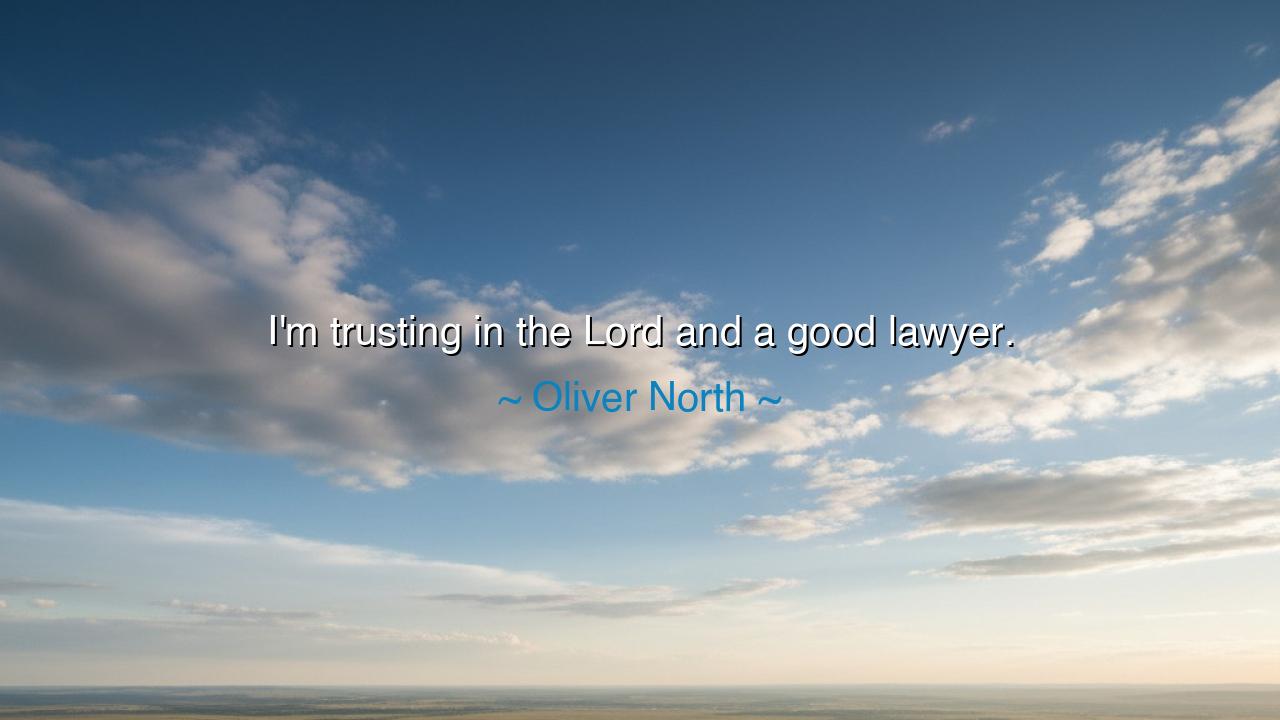
I'm trusting in the Lord and a good lawyer.






In the words of Oliver North, uttered during a time of great turmoil, we hear the stark blend of faith and pragmatism: “I’m trusting in the Lord and a good lawyer.” This saying, though simple, is layered with meaning. It is the voice of a man standing at the crossroads of divine providence and human judgment, where the eternal hand of heaven and the frail institutions of earth must both be reckoned with. His words carry the resonance of a soldier who has seen both battlefield and courtroom, who knows that life’s trials are fought on more than one front.
The origin of this quote reaches back to the Iran-Contra affair of the 1980s, when Oliver North, a Marine Corps officer, stood accused in one of America’s most controversial political scandals. Brought before the judgment of man, yet professing allegiance to the judgment of God, North revealed the dual reality of human existence: that one must seek divine mercy even as one navigates the laws of society. This was not a cry of despair, but a declaration of reliance—on both eternal justice and mortal advocacy. For in the world of men, even the faithful need defenders, and even the righteous need representation.
The meaning of his words reaches beyond his own trial. To place trust in the Lord is to recognize that no human system is flawless, and that ultimate justice lies in hands unseen. To place trust in a lawyer is to acknowledge that while the heavens govern eternity, the courts govern the present. North’s statement is both humble and wise: it admits human vulnerability, while also showing respect for the structures of law that order a nation. It is a recognition that man walks in two realms—heavenly and earthly—and must not neglect either one.
Consider, by way of example, the story of Socrates, the philosopher of Athens, who also faced trial for his teachings. Socrates placed his trust in reason, in truth, and in the divine order, even while standing before a jury of his peers. Yet unlike North, he spurned earthly defense, choosing instead to embrace death as a testimony of principle. Where Socrates leaned wholly on the unseen justice of the cosmos, North leaned on both God and man, acknowledging that sometimes survival requires the balance of faith and strategy. Both men illustrate the ancient truth: that life is often judged twice—once by the eternal, and once by the temporal.
There is also a deeper emotional tone in North’s words, for they echo the uncertainty of all who have ever faced accusations, hardships, or trials. Who among us, when pressed by the weight of circumstance, has not whispered, “God help me, and may those beside me be wise”? It is the cry of every soul that knows the fragility of its own strength. His words are not merely political; they are human. They remind us that faith alone does not absolve us of responsibility, and human skill alone is not enough without divine favor.
To future generations, the teaching here is plain: walk with humility. Trust in the higher order, but do not neglect the counsel of the wise. One who relies only on heaven without action may be crushed by the weight of earthly affairs; one who relies only on man without reverence may win the trial but lose the soul. North’s saying is a parable of balance—between the unseen and the seen, between prayer and preparation, between eternal hope and daily discipline.
The lesson for us is simple yet profound: when facing trials—whether in courts, in workplaces, or in the hidden chambers of the heart—do not attempt to walk alone. Seek the Lord for strength and clarity, and also seek those who are gifted in wisdom, counsel, and skill. This dual trust is not weakness, but wisdom, for it honors both heaven’s sovereignty and earth’s order. As the ancients taught: “The gods help those who labor.”
So let us go forth with this teaching: place your heart in the hands of the divine, and your steps in the guidance of the wise. When storms arise, pray with sincerity, and also prepare with diligence. Be faithful in both realms, for those who balance the eternal with the earthly shall stand firm, even when the gales of trial howl about them. Thus we learn from Oliver North: salvation is found in trust, but survival is secured by both faith and wisdom.






AAdministratorAdministrator
Welcome, honored guests. Please leave a comment, we will respond soon